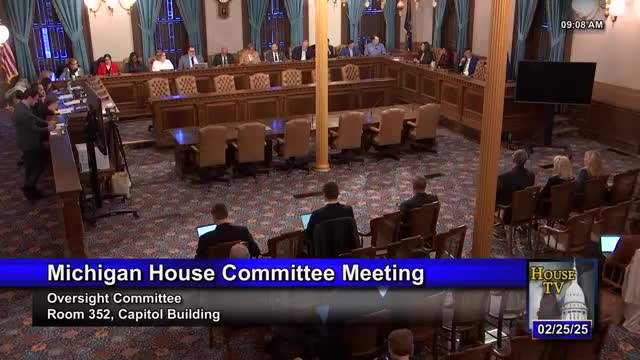Michigan auditor general briefs House Oversight Committee on audit role, powers and procedures
Get AI-powered insights, summaries, and transcripts
Subscribe
Summary
Auditor General Doug Ringler told the Michigan House Oversight Committee on Thursday that the Office of Auditor General is a legislative agency charged with after‑the‑fact financial, performance and investigative audits and exists to “be independent fact finders and fact providers to assist you in your decision making.”
Auditor General Doug Ringler told the Michigan House Oversight Committee on Thursday that the Office of Auditor General is a legislative agency charged with after‑the‑fact financial, performance and investigative audits and exists to “be independent fact finders and fact providers to assist you in your decision making.”
The briefing gave committee members an overview of audit types, the office’s statutory and constitutional basis, typical audit scope and methodology, and how agencies respond to findings — information lawmakers said they want to use to guide oversight and potential follow‑up actions.
Ringler opened the presentation by saying the office was created under the Michigan Constitution (1963) and by statute and that it performs three core audit products: post financial audits, performance audits and investigative audits. “We are a legislative agency. We’re here to be independent fact finders and fact providers to assist you in your decision making,” Ringler said. Deputy Auditor General Laura Hurst walked members through the office’s annual report, the different audit products and the report layout that legislators will receive.
Hurst said the office’s work is split roughly evenly between financial and performance audits — “You can see from the graph there that we our audits are split pretty evenly between financial and performance audits” — and described other products including preliminary survey summaries, limited‑scope question‑and‑answer requests, and follow‑up audits done about 18–24 months after a performance report. She said material findings are identified based on both quantitative and qualitative considerations tied to each audit’s objectives and that agencies receive a preliminary response and must submit corrective action plans to the State Budget Office’s Office of Internal Audit Services.
Ringler and Hurst provided several operational details members asked about. The office’s gross budget is about $31,000,000, roughly two‑thirds of which comes from the general fund. It employs about 168 people, including 51 CPAs and 22 staff with master’s degrees; roughly 91% of costs are salaries and wages. In 2024 the office conducted 17 performance audits and 17 financial audits, and typically has 30–40 audits in progress at a time. A typical performance audit runs roughly 2,000 hours; using the office’s internal billing rate of about $100 per hour, a representative cost estimate for a full performance audit is about $200,000, though projects vary in scope and cost.
On process and powers, Ringler said auditors work to confirm facts with agencies before issuing findings and that agencies often agree to corrective actions. If an agency disputes conclusions, the office may add an auditor’s comment in the report to call out inconsistent responses. The office has statutory access to confidential state records, limited subpoena power that has rarely needed to be used, and keeps audit workpapers and working files out of the Freedom of Information Act (FOIA) disclosure process. Ringler: “We don’t have enforcement power. So we just report what we found, our position, their position, then it would be up to the executive branch in the legislature to decide. Are we gonna make a change or not?”
Committee members pressed the auditors on practical matters. Representative Brock and others asked whether on‑site corrective actions are recorded; Hurst said agencies’ immediate fixes are noted in the agency response and the office reports what was observed during the audit period. Representatives asked about the office’s handling of fraud allegations and whistleblower confidentiality; Ringler said complaint filers can remain anonymous but that anonymity can limit the auditors’ ability to follow up and obtain evidence. He summarized last‑year intake numbers for allegations: 52 complaints referred to another agency, 95 lacked authority, 44 lacked sufficient information, 22 handled internally, and 16 sent to other agencies.
The auditors described limited‑scope work: question‑and‑answer letters or targeted reviews that do not draw full audit conclusions. Hurst said the office posts Q&A reports or limited products to its website when the work exceeds 40 hours. Members also asked about audits that may affect federal funding or litigation; the auditors explained that some findings aim to prevent federal funding loss or reduce litigation risk rather than immediate cost savings.
Rep. Pawlowski and others asked how legislators can request audits. Ringler said the office prefers a pre‑request conversation to determine authority, data access and alignment with the office’s risk‑based work plan; formal requests typically arrive in writing and are evaluated against staffing and risk priorities. The auditors said they maintain a monthly status summary and a public library of released reports on their website and that they regularly meet with members and staff to explain methodology and findings.
Near the end of the meeting Chair DeBoer announced two public contact tools for committee oversight work: an email address, oversight@house.mi.gov, and a public tip portal at MiOversight.com. DeBoer said substantive messages would be shared with the committee. The committee then adjourned.
Votes at a glance: The committee adopted a proposed committee rule and separately adopted the day, time and location for future meetings; both motions were recorded as approved in the committee’s voice roll calls during the meeting.
Ending: The auditors said they are available for office‑level briefings and to meet individually with legislators and staff to discuss specific audits or data questions. Hurst and Ringler offered contact through the office’s state relations officer, Kelly Miller, and said monthly and quarterly planning summaries are circulated to legislative offices.
